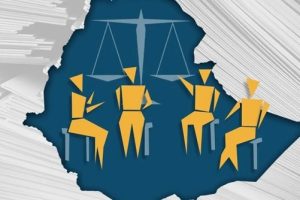Ethiopia participated at the 16th BRICS annual summit in Kazan, Russia, where several heads of state participated. It is the largest gathering of world leaders in Russia in decades. It is known that BRICS stands for Brazil, Russia, India, China and South Africa the group started in 2006 and the BRIC summit was convened in 2009 with South Africa having joined the bloc a year later.
The alliance aims to challenge the economic and political monopoly of the West, the group setting priorities and having discussions once every year during the summit which members take turns hosting. This year’s summit was attended by not only the members of the bloc but also by others who are aspiring to join the community, including most notably the leaders of Turkey and Vietnam. United Nations Secretary-General Antonio Guterres also attended the summit even if Ukraine and some Western countries were not comfortable nor approved of the stance of the head of the UN.
In the end, the summit was considered a success for not only Ethiopia but also for the host nation Russia and the BRICS block as a whole, dismissing the reservations of many Western outlooks on the event. Many Western political analysts stated that it was a huge PR success for President Putin that tried to make his country feel less isolated in the international scene, challenging the West’s attempts to sanction him extensively and force him to change his stance on the Ukraine conflict.
It was the first time that Ethiopia participated in such a summit since its joining the BRICS as a full member in January 2024. It was a summit in which Ethiopia made her voice heard by urging that among other things, there should be a reform of the global financial system and that a place should be given to Africa in the Security Council of the United Nations.
BRICS is in fact a group of nations that has been campaigning for a reform in the world financial and economic system as well as promoting the South-South Cooperation among developing nations who feel somewhat marginalized from the richer world and do not have a fair share of the benefits of global economic development and growth due to certain unfair practices that do not embrace the interests of the less developed South.
Ethiopia has joined the BRICS community because it wants to promote its national interest by seeking collaboration and partnership with the huge member nations of BRICS. The summit that ended a few days ago has concluded with multiple and extensive discussions and agreements on various issues of huge significance to Ethiopia.
The Ethiopian high-level delegation led by Prime Minister Abiy Ahmed took part actively in the October 22–24, 2024, discussions that aimed at shaping a more equitable global order. It made sure that the interests of Ethiopia were well represented in the arena by contributing valuable insights to the deliberations. Given that the BRICS block represents a powerful economic group of nations that accounts for a third of the global economy and about half of the world’s population, its impact on world affairs cannot be ignored or sidelined, and that is why Ethiopia has been anxious to seek its membership role in the bloc. And if we consider that more than thirty countries have expressed their interest to join the bloc, it means that BRICS will further impact the world order and contribute solidly to its betterment, seeking more fairness and justice. By representing influential emerging economies, BRICS offers a platform for countries often underrepresented in global affairs.
The summit was also important for Ethiopia’s stance in the world as members of BRICS expressed their interest in collaborating with Ethiopia in areas of peace and security by working together. It was a venue where Ethiopia made its point that global conflicts and tensions were having a negative impact on peace and security and a lot of harm is being caused to civilians. The threats of cyber-attacks, misinformation and hate speech are mentioned as affecting the global peace in this highly digitalized era. One of the outcomes of the summit was that countries have pledged to enhance the capacity of the security institutions and collectively contribute towards global peace. Ethiopia’s contribution to the safeguarding of peace and security has been highlighted at the summit. And more willingness has been shown on the part of countries at the summit to cooperate with Ethiopia in this sphere.
Several bilateral meetings and discussions were held on the sidelines of the summit in which Prime Minister Abiy Ahmed engaged in extensive talks with for instance President Vladimir Putin of Russia after which Abiy expressed his appreciation to the president for the in-depth discussions during the meeting. The premier has mentioned the historical ties between Russia and Ethiopia and that the common BRICS platform will allow Ethiopia to engage with broader economic cooperation with Russia.
Abiy also held bilateral talks with the President of the UAE Mohammed bin Zayed Al Nahyan and President of South Africa Cyril Ramaphosa on issues of mutual interest. So did he with President of the Islamic Republic of Iran Masoud Pezeshkian expressing Ethiopia’s support to de-escalate tensions in the Middle East.
During the various discussion platforms, Prime Minister Abiy Ahmed emphasized that Ethiopia’s quest for sea outlets is based on shared interests and that given the history, geography, population and economic development of the country Ethiopia needs access to the sea. The premier also shared the economic reforms Ethiopia was implementing and the enhancement of its institutional capacity building. The Summit has offered Ethiopia an opportunity to have its interests aligned with the decisions taken and it has benefited Ethiopia in the areas of economy, trade, investment and other areas.
According to the Minister of Foreign Affairs Gedion Timotheos, Ethiopia has successfully promoted its efforts to protect its national interests and global clouts at the BRICS summit. The minister said Ethiopia’s voice was heard and amplified on the global stage. The summit led to important decisions on matters such as economic cooperation, regional security and the reform of the United Nations Security Council. Ethiopia has aligned itself with the collective positions of other African countries on these key discussions. Many countries aspiring to be accepted as new members of BRICS sought the support of Ethiopia to achieve that status. Hence it was a huge success for Ethiopia to have attended and contributed to the carrying out of the 16th BRICS Summit.
BY FITSUM GETACHEW
THE ETHIOPIAN HERALD WEDNESDAY 30 OCTOBER 2024



